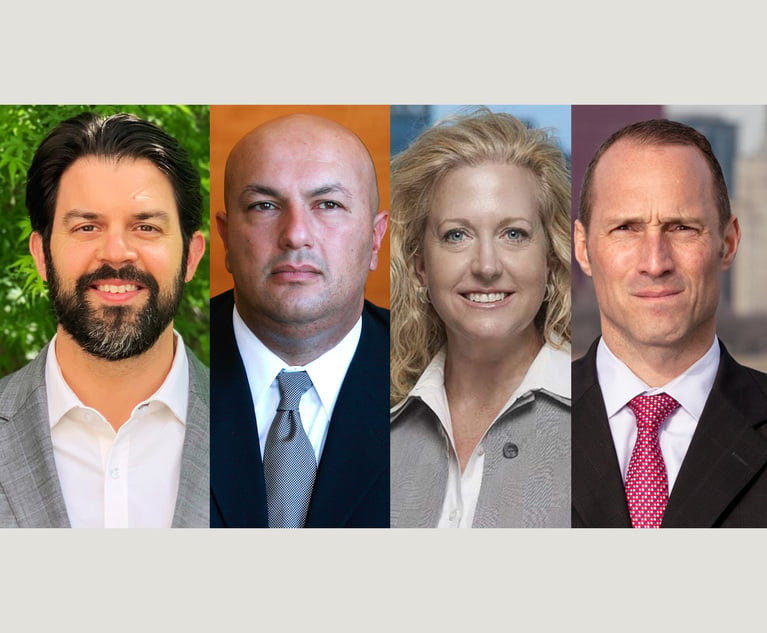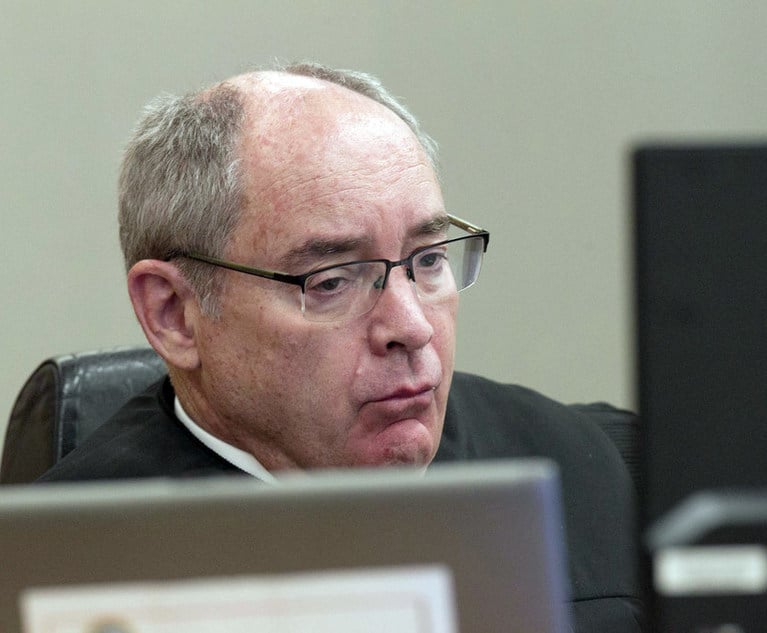The 2018 Farm Bill, Hemp and Interstate Commerce
Among other things, the 2018 Farm Bill removed hemp from the Controlled Substances Act, unlocking a new industry that is poised to make serious waves throughout the agricultural sector and beyond.
June 21, 2019 at 02:00 PM
8 minute read
 Cascade Creatives/Shutterstock.com
Cascade Creatives/Shutterstock.com
Imagine a world where, before legislative enactment, Congress considered every possible factual scenario, detailed every possible legal nuance, and left no practical ambiguity to interpretive chance. Unfortunately, this imaginary world is just that—imaginary. And the Agricultural Improvement Act of 2018, or more commonly referred to as the "2018 Farm Bill," is no exception.
On Dec. 20, 2018, President Trump signed into law the 2018 Farm Bill, which became effective on Jan. 1, 2019. Among other things, the 2018 Farm Bill removed hemp from the Controlled Substances Act, and amended certain federal laws relating to the production and marketing of hemp, as well as derivatives of the plant, including cannabidiol, or CBD. While most of these amendments involve the production of hemp, certain amendments implicate the sale of hemp and hemp-derived products.
These sale-related amendments have raised both legal and practical questions, particularly over the interaction between Congress' clear intent to delegate primary regulatory authority to the states, with Congress' equally clear intent that hemp generally be treated as any other agricultural commodity. Before analyzing the bounds of the 2018 Farm Bill, however, it is important to first understand the regulatory framework promulgated by Congress.
As a general matter, the 2018 Farm Bill offers primary regulatory authority over the production of hemp to each individual state. Under the 2018 Farm Bill, this authority must be expressed in a "plan" under which the particular state monitors and regulates the production of hemp. A state plan must include (1) a practice to maintain relevant land information where hemp is produced; (2) a procedure for testing tetrahydrocannabinol, or THC, levels of hemp; (3) a procedure for disposing of non-compliant hemp plants; (4) enforcement procedures for violations; (5) a procedure for annual, random sample testing to ensure compliance; (6) a procedure for sharing information with the federal government; and (7) a certification that the state has the resources to carry out its plan.
Importantly, the 2018 Farm Bill also allows states to include any other practice or procedure, so long as the practice or procedure is "consistent with this subtitle." Indeed, the 2018 Farm Bill expressly allows states to enact more stringent hemp laws without facing federal preemption. Once a state plan is submitted to the U.S. Department of Agriculture (the "Department"), the Secretary of the Department has 60 days to approve or reject the plan, according to the Bill. Approval of a state plan is required.
In states without approved plans, hemp producers must comply with a federal plan established by the Secretary of the Department, which has nearly identical requirements as the state plans. The federal plan essentially acts as a floor for states that choose to establish their own plans, and a backstop for those states that do not. According to a recent statement issued by the Department, development of the federal plan is underway and will likely be ready for the 2020 growing season.
With respect to the sale of hemp, the 2018 Farm Bill expressly provides that it does not prohibit interstate commerce of hemp. Even further, the 2018 Farm Bill also forbids states from prohibiting the transportation or shipment of hemp or hemp products, including hemp-CBD, through the state if produced in accordance with the 2018 Farm Bill or other federal laws. At first blush, these provisions appear to give hemp producers and distributors free-reign to sell and transport their products nationwide without fear of state-specific prohibitions. Not so.
Before the 2018 Farm Bill, there was the Agricultural Improvement Act of 2014, or the "2014 Farm Bill." The 2014 Farm Bill permitted qualifying individuals and entities, through state agricultural pilot programs, to grow, cultivate and market industrial hemp, but for research purposes only. Most state hemp and hemp-related criminal laws were, therefore, tailored specifically to conform to the 2014 Farm Bill requirements, including the research requirement.
For example, New Jersey's criminal code prohibits the manufacture, distribution or possession of "marijuana," which is defined under New Jersey law to exclude, among other things, "industrial hemp cultivated pursuant to the New Jersey Industrial Hemp Pilot Program." This definition has not been amended since the enactment of the 2018 Farm Bill. And, since a New Jersey hemp plan has not yet been approved—a pre-requisite to triggering the 2018 Farm Bill's hemp transportation protections—the question becomes: Is all New Jersey hemp currently illegal under state law?
This was the question in Big Sky Scientific v. Idaho State Police, Case No. 19-CV00040 (D. Idaho 2019), but under similar Idaho law. In Big Sky, Idaho police seized 6,701 pounds of Oregon hemp from a truck passing through the state on its way to Colorado. Despite demonstrating that the Oregon-licensed product contained less than .3% THC, thus qualifying as "hemp" under the 2018 Farm Bill and applicable Oregon state law, prosecutors refused to release the product, or drop the drug trafficking charges lodged against the driver, because the hemp was not produced in accordance with the 2018 Farm Bill. In other words, the state argued that because the Department has not yet approved any state plans, the 2018 Farm Bill's hemp transportation protections do not apply since no hemp has been produced in accordance with the 2018 Farm Bill. Idaho's hemp transportation restrictions, therefore, remain valid and enforceable.
In his opinion denying a preliminary injunction, the magistrate judge agreed with Idaho. The magistrate acknowledged Oregon law authorizing the cultivation of hemp, noting the plaintiff's assertion that the hemp was produced by a grower licensed by the Oregon Department of Agriculture. However, the magistrate concluded that, in enacting the 2018 Farm Bill, Congress intended to "create a regulatory framework around the production and interstate transportation of hemp for purposes of federal law, and that framework is to be contained in the federal (or compliant state or tribal) plan for production of hemp found in the 2018 Farm Bill." Although the 2018 Farm Bill allows hemp to be transported across state lines, the magistrate found those interstate commerce protections apply only to hemp produced under regulation of the 2018 Farm Bill. Therefore, because those regulations do not exist, the court held that the interdicted hemp was subject to Idaho law prohibiting its transportation.
In a recent USDA memorandum, the Office of General Counsel argued that the magistrate was correct in his holding that the 2018 Farm Bill's hemp transportation protections have not yet kicked in for hemp grown outside of the 2014 Farm Bill, but disagreed with the conclusion that hemp grown under the 2014 Farm Bill was not protected. Specifically, the USDA argued that the 2014 Farm Bill qualified as "other federal law," under which the 2018 Farm Bill provides inter-state commerce protections. Nevertheless, Big Sky represents just one issue involving the interplay between federal and state authority governing hemp.
Another, is whether states can outright ban hemp or hemp derived products, other than those being transported through the state. This is particularly relevant given the concerns some jurisdictions have recently expressed on CBD-infused products, including food and beverages. One such jurisdiction is New York City, whose health department recently banned such products until the U.S. Food and Drug Administration weighs in.
As a matter of constitutional law, the Supremacy Clause provides a clear rule that federal law "shall be the supreme Law of the Land; and the Judges in every State shall be bound thereby, any Thing in the Constitution or Laws of any state to the Contrary notwithstanding …." Under this principle, Congress has the power to preempt state law.
Federal courts generally recognize three categories of preemption: (1) express preemption (where Congress revokes powers from a state through an express preemption provision); (2) field preemption (where states are precluded from regulating conduct in a field that Congress has determined must be regulated by its exclusive governance); and (3) conflict preemption (where state laws are preempted when they conflict with federal law).
It is clear that any state law prohibiting the interstate transportation of hemp or hemp products would result in conflict preemption—at the least—because the two laws would be in direct conflict. However, the result is less clear in the case of a state law that proposes to ban hemp or hemp derived products, with the exception of those traveling through the state. First, the 2018 Farm Bill did not affirmatively legalize hemp. Rather, the 2018 Farm Bill simply removed hemp from the Controlled Substances Act. Second, Congress clearly did not intend to exclusively govern all facets of hemp or hemp derived products given the inclusion of state plans as the primary regulatory authority. Finally, it would theoretically be possible to comply with both federal law and state law if the state law included a carve out for the transportation or shipment of hemp and hemp derived products. These issues will likely be resolved over time as cases like Big Sky and others proceed throughout the country. Nevertheless, it is beyond dispute that the 2018 Farm Bill has unlocked a new industry that is poised to make serious waves throughout the agricultural sector and beyond.
Joshua Horn is a partner with Fox Rothschild in Philadelphia, and co-chair of the firm's Cannabis Law practice. Jesse M. Harris is an associate at the firm.
This content has been archived. It is available through our partners, LexisNexis® and Bloomberg Law.
To view this content, please continue to their sites.
Not a Lexis Subscriber?
Subscribe Now
Not a Bloomberg Law Subscriber?
Subscribe Now
NOT FOR REPRINT
© 2025 ALM Global, LLC, All Rights Reserved. Request academic re-use from www.copyright.com. All other uses, submit a request to [email protected]. For more information visit Asset & Logo Licensing.
You Might Like
View All

MDL Judge: 'Significant Number of Plaintiffs' Can't Allege Paraquat Exposure
8 minute read
Why the Wide Range of Roundup Verdicts? It Might Depend on What Juries Hear About the EPA
8 minute read
Roundup MDL Lead Counsel Defend Fee Allocations: 'Limited Funds Available'
5 minute readTrending Stories
- 1Gunderson Dettmer Opens Atlanta Office With 3 Partners From Morris Manning
- 2Decision of the Day: Court Holds Accident with Post Driver Was 'Bizarre Occurrence,' Dismisses Action Brought Under Labor Law §240
- 3Judge Recommends Disbarment for Attorney Who Plotted to Hack Judge's Email, Phone
- 4Two Wilkinson Stekloff Associates Among Victims of DC Plane Crash
- 5Two More Victims Alleged in New Sean Combs Sex Trafficking Indictment
Who Got The Work
J. Brugh Lower of Gibbons has entered an appearance for industrial equipment supplier Devco Corporation in a pending trademark infringement lawsuit. The suit, accusing the defendant of selling knock-off Graco products, was filed Dec. 18 in New Jersey District Court by Rivkin Radler on behalf of Graco Inc. and Graco Minnesota. The case, assigned to U.S. District Judge Zahid N. Quraishi, is 3:24-cv-11294, Graco Inc. et al v. Devco Corporation.
Who Got The Work
Rebecca Maller-Stein and Kent A. Yalowitz of Arnold & Porter Kaye Scholer have entered their appearances for Hanaco Venture Capital and its executives, Lior Prosor and David Frankel, in a pending securities lawsuit. The action, filed on Dec. 24 in New York Southern District Court by Zell, Aron & Co. on behalf of Goldeneye Advisors, accuses the defendants of negligently and fraudulently managing the plaintiff's $1 million investment. The case, assigned to U.S. District Judge Vernon S. Broderick, is 1:24-cv-09918, Goldeneye Advisors, LLC v. Hanaco Venture Capital, Ltd. et al.
Who Got The Work
Attorneys from A&O Shearman has stepped in as defense counsel for Toronto-Dominion Bank and other defendants in a pending securities class action. The suit, filed Dec. 11 in New York Southern District Court by Bleichmar Fonti & Auld, accuses the defendants of concealing the bank's 'pervasive' deficiencies in regards to its compliance with the Bank Secrecy Act and the quality of its anti-money laundering controls. The case, assigned to U.S. District Judge Arun Subramanian, is 1:24-cv-09445, Gonzalez v. The Toronto-Dominion Bank et al.
Who Got The Work
Crown Castle International, a Pennsylvania company providing shared communications infrastructure, has turned to Luke D. Wolf of Gordon Rees Scully Mansukhani to fend off a pending breach-of-contract lawsuit. The court action, filed Nov. 25 in Michigan Eastern District Court by Hooper Hathaway PC on behalf of The Town Residences LLC, accuses Crown Castle of failing to transfer approximately $30,000 in utility payments from T-Mobile in breach of a roof-top lease and assignment agreement. The case, assigned to U.S. District Judge Susan K. Declercq, is 2:24-cv-13131, The Town Residences LLC v. T-Mobile US, Inc. et al.
Who Got The Work
Wilfred P. Coronato and Daniel M. Schwartz of McCarter & English have stepped in as defense counsel to Electrolux Home Products Inc. in a pending product liability lawsuit. The court action, filed Nov. 26 in New York Eastern District Court by Poulos Lopiccolo PC and Nagel Rice LLP on behalf of David Stern, alleges that the defendant's refrigerators’ drawers and shelving repeatedly break and fall apart within months after purchase. The case, assigned to U.S. District Judge Joan M. Azrack, is 2:24-cv-08204, Stern v. Electrolux Home Products, Inc.
Featured Firms
Law Offices of Gary Martin Hays & Associates, P.C.
(470) 294-1674
Law Offices of Mark E. Salomone
(857) 444-6468
Smith & Hassler
(713) 739-1250






